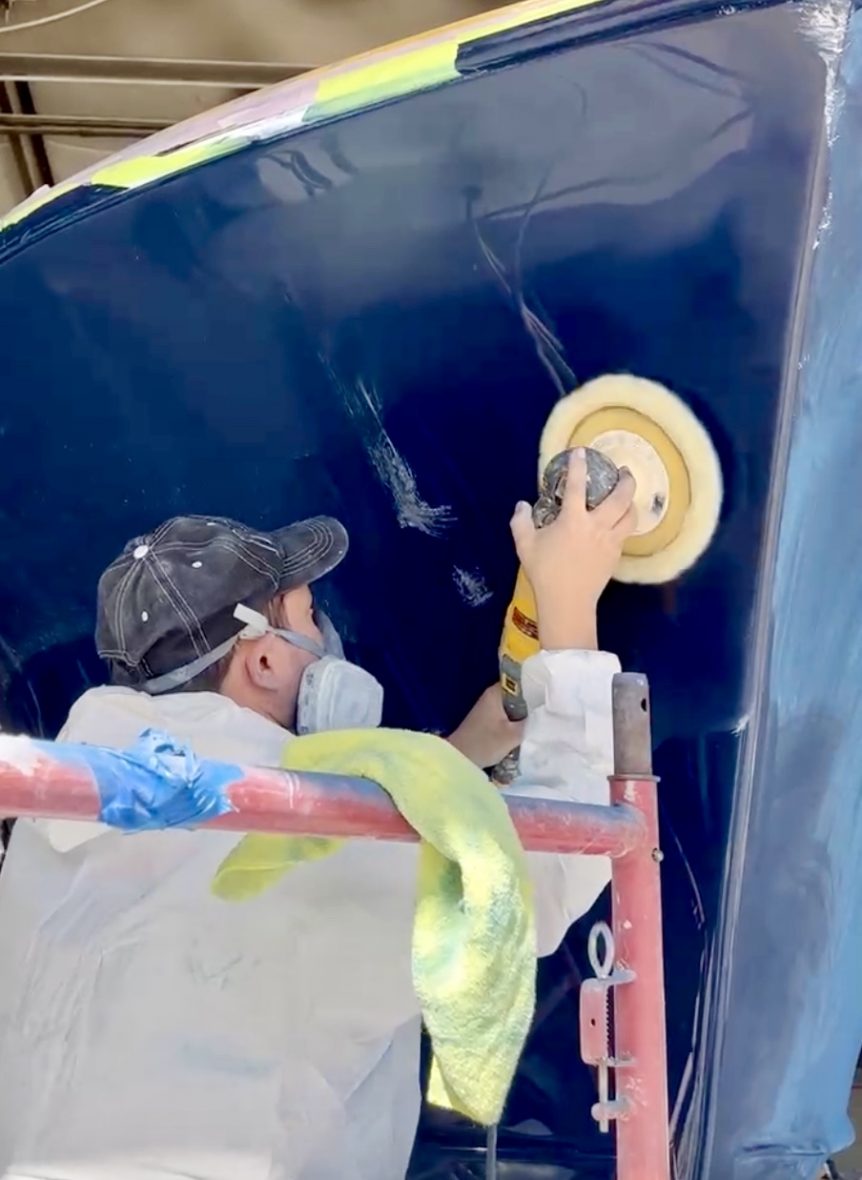Release Boatworks hulls come painted with top-quality Awlgip paint products, which provide many years of beautiful, mirror-like, glossy shine, even when used day-in and day-out in harsh conditions. Salt water and sunlight are not friends of paint, but with a steady maintenance program and some attention to detail, you can keep your boat shining brightly for many years. Here are some tips to protect your Awlgripped hull.
Tips for Maintaining Awlgrip Paints
DO:
1. Wash the surface regularly with Awlwash 73234 and water. Regular cleaning will avoid build up which can slowly attack the topcoat, prematurely ageing the coating. Use soft, non-abrasive cloths, sponges or washing mitts when washing.
2. For Awlgrip topcoat, solvents such as Awlprep T0008, Awlprep Plus T0115, toluene, lacquer thinner, M.E.K., acetone or kerosene may be used to soften or remove heavy build ups of grease and grime, felt tip markings or spray paint on the topcoat. For Awlcraft 2000 and Awlgrip HDT, you should use only mild solvents to remove stubborn stains. Awlprep T0008, mineral spirits, xylene, kerosene, and diesel fuel are acceptable for use on these topcoats.
For all Awlgrip finishes, apply solvents with soft, clean cloths. Wipe up solvent quickly. Do not allow solvent to dry on the surface or puddle and soak into the surface. Wash these areas with mild detergent and water to remove solvent residue. When using solvents to remove stains, test an inconspicuous area first.
3. Always thoroughly rinse all surfaces with fresh water after cleaning with Awlwash or solvents. Latent solvent residue can attack the topcoat, while detergent residue will attract dirt.
4. Use distilled white vinegar and hot water to remove stubborn salt stains. Washing with Awlwash after use of vinegar is recommended.
5. Use Awlcare 73240 by hand only to remove stubborn diesel soot stains. For all Awlgrip finishes, protecting the surface with Awlcare 73240 will help maintain the gloss of your Awlgrip finish. Awlcare is a hand applied, non-abrasive, synthetic polymer. When applied regularly it will remove mild stains, water spots, and diesel soot, while increasing resistance to attack from acid rain and other pollutants. It contains no harsh abrasives and leaves a nonyellowing, protective polymer coating which lasts through multiple washings. Use Awlcare to temporarily seal and restore gloss to painted surfaces dulled by age or mistreatment.
DO NOT:
1. Use traditional waxes. Traditional waxes break down rapidly, attract dirt, and the residue can cause the finish to appear yellow. This creates the need to maintain the wax, increasing overall maintenance. Traditional waxes which contain no abrasives do little harm to the coating, but they also offer no benefit. Awlgrip has developed Awlcare Protective Polymer Sealer 73240 for those who want to enhance their finish and need the additional cleaning power of a hand applied, dry wash product. Awlcare is a non-yellowing sealer that will protect your Awlgrip finish with regular applications. Hand applied Awlcare will not harm Awlgrip finishes and can easily be removed with Awlprep Plus T0115 (or T0340 Surface Cleaner in Europe) when it is time to repaint.
For Awlgrip topcoat only, regular applications of Awlcare will help temporarily seal and restore shine to painted surfaces that have become porous due to age or mistreatment, helping to maintain a satisfactory appearance until there is time to repaint. Do not use polishing compounds on Awlgrip G/H Line topcoat.
For Awlcraft 2000 and Awlgrip HDT, use Awlcare Protective Polymer Sealer—it will help maintain the gloss on these finishes with regular applications, especially those which have been buffed or polished. Remember, Awlcare is only to be applied and buffed by hand. Never apply or buff Awlcare with a machine.
2. Do not use abrasives or scratch pads to clean the surface. Scratching the surface gives dirt a place to cling to while wearing out the resin layer. Using abrasives of any kind will reduce the overall life of the finish (and, most importantly, voids the Awlgrip Limited Warranty).
3. Do not allow contact between the Awlgrip finishes and teak cleaners. Most teak cleaners contain acids or caustic agents that will stain and discolor an Awlgrip finish.
4. Do not allow metal polishes to dry on the surface of Awlgrip finishes. Metal polishes may discolor and stain the painted surface, and they often contain acids. Rainwater and dew running off metal fittings will spread metal polish residue onto the paint surface, which will in turn etch and dull the paint finish. Washing freshly polished metal fittings thoroughly with Awlwash and water can help eliminate polish residue and reduce metal polish run off.
5. Do not use strong solvents such as lacquer thinner or acetone to clean Awlcraft 2000, Awlgrip HDT, Awlbrite Clear or Awlspar varnish.
6. Do not allow wet equipment such as seat cushions, coils of line, sails, sail covers, and coolers to trap and hold moisture against Awlgrip finishes. This condition can result in blistering or delamination of the Awlgrip finish.
7. Do not use acrylic Teflon coatings over an Awlgrip Finish. Use of these coatings void the Awlgrip Limited Warranty.
8. Do not ‘shrink wrap’ or tightly bind Awlgrip finishes with plastic wrappings. The cover system, whether synthetic or made of natural fiber, should be ventilated to allow the coating system to breathe. Do not pull the cover tight to the painted surface, as this can trap and hold moisture on the surface, resulting in loss of gloss, blistering, or delamination of the topcoat. Also, don’t allow the cover to chafe against the painted surface—a chafing cover, especially when accompanied by airborne dirt, can abrade the surface and cause premature loss of gloss.



